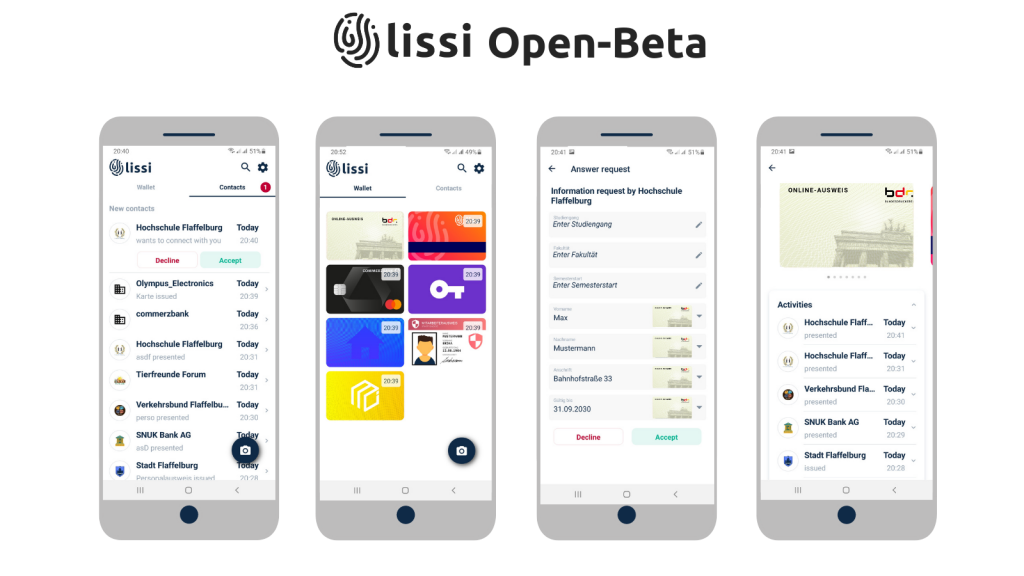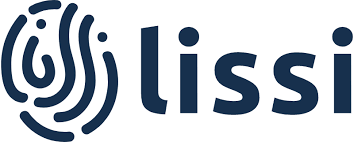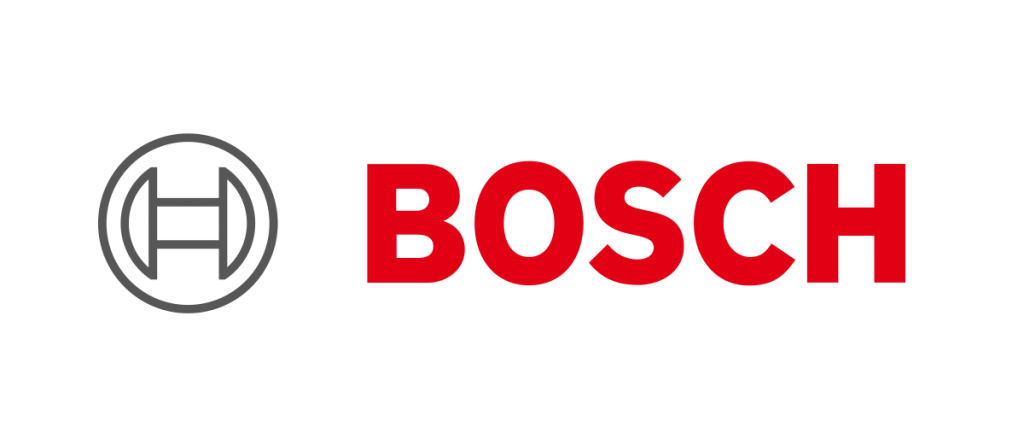
About the project
Goals of the organisation
The basic prerequisites for the emergence and establishment of the digital economy are digital identities which are openly accessible, interoperable, secure and easy to use.
The network is based on decentralised, heterogeneously distributed nodes and agents and fits into the European legal framework (GDPR and eIDAS).
The organisation offers, under European legal framework and principles, a
decentralised network and organisational guidelines for the global protection and use of:
We follow international standards of the World Wide Web Consortium (W3C), the Decentralised Identity Foundation (DIF) and the Trust over IP Foundation (ToIP). These manage and standardise Verifiable Credentials, Decentralised Identifiers (DID), as well as the DIDComm protocol. Their aim is to ensure the best possible interoperability with other SSI networks.
The establishment of data sovereignty for individuals, companies and end users.
Objectives of the Network
Security by design
The decentralised structure ensures that there is no central point of attack. The nodes of the network, which are operated by different partners, are not only geographically distributed, but are also operated in different system architectures. This redundancy offers a high degree of availability and resiliency.
Privacy by design
No personal data is stored on the network itself - not even as hash. In order to protect privacy right from the start, this data is stored on the user's end device. The network has limited write permissions to comply with these requirements. The communication itself takes place via encrypted end-to-end channels between the individual participants. The verification of data is asynchronous and can be carried out by the verifier without involving the issuer.
Accountability of governance
The network is managed by a European Cooperative Society (Societas Cooperative
Europaea, S.C.E.), which determines the network rules and its implementation as a legal entity. The participants of the network have defined rights and obligations to enable legally binding relationships.
Open innovation
Anyone can develop applications based on the network themselves. Entry barriers should be kept as low as possible. The basic components for the exchange of information between agents are standardised so that the use of different providers is guaranteed. Apart from these core elements, innovation is thus given free rein.
Block-Explorer
We have set up a block explorer, which you can use to search for entries such as schemas or credential definitions. It also provides general information about the network such as the nodes and the current status. You can find the block explorer here.
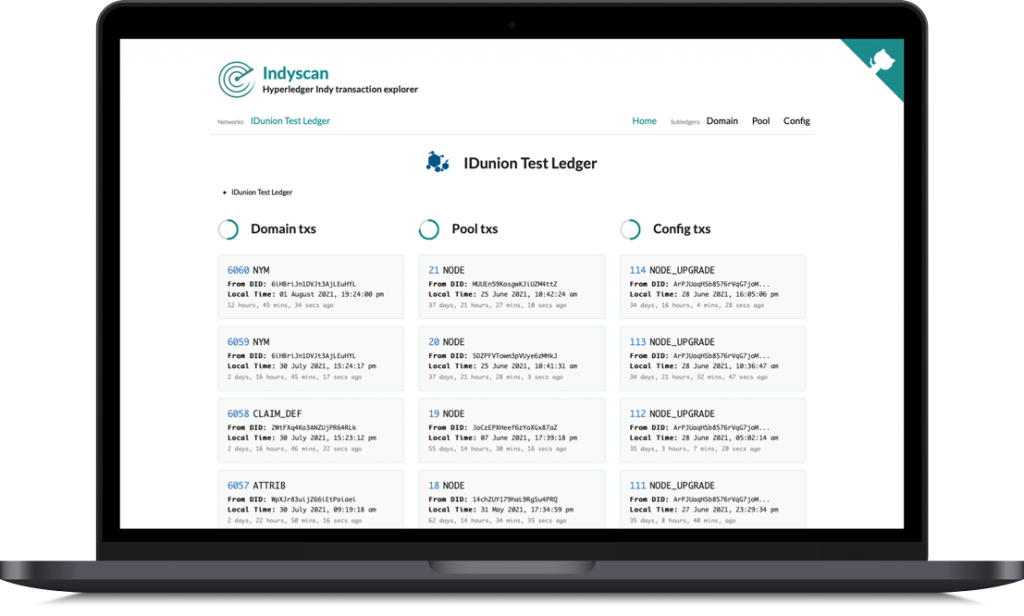
Roadmap
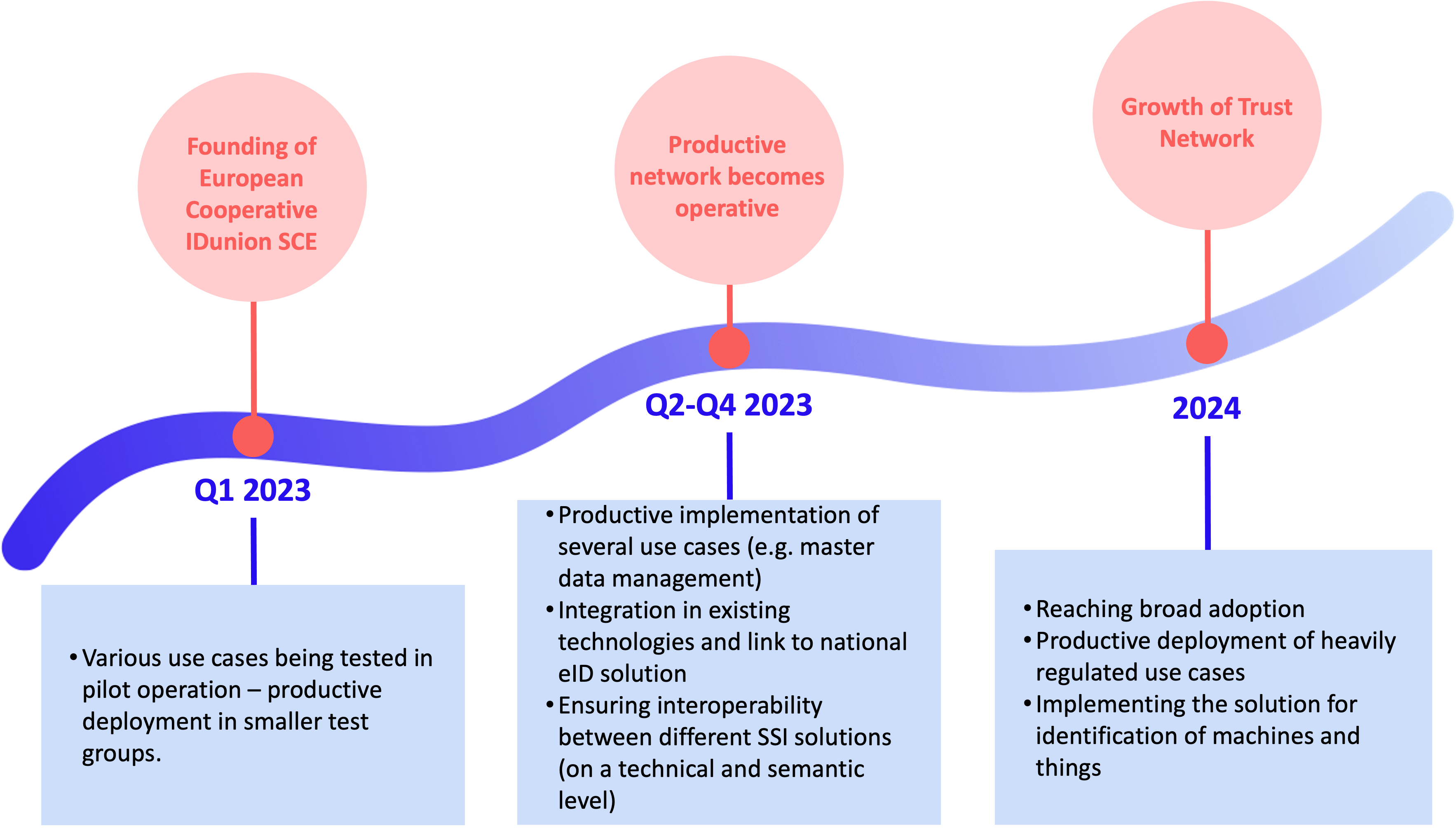
Benefits for the user
Users can digitise the cards in their wallets and use them to conveniently identify themselves on the internet. One of several wallet apps offered can be downloaded to the mobile device and used to receive, store, manage and present digital credentials. The data is stored locally on the mobile phone and can be transferred from wallet to wallet. Selective disclosure of personal data and encrypted communication prevent the creation of user profiles by third parties. The wallet offers the possibility of storing, managing and sharing all personal data in a bundled form as required. This facilitates access to online offers of companies and institutions and creates transparency for all parties involved.


Benefits for companies
The network enables the clear verification of customers, companies and institutions. This facilitates access for customers and saves companies time, costs and administrative work. Since companies can independently verify the identities of business contacts, identity fraud is prevented to a large extent.
Furthermore, the single sign-on functionality offers the user a
user-centred alternative to a password or the dependence on a single technology provider. Since users store their data themselves, this leads to fewer obligations and potential penalties of data protection regulations such as the GDPR.
Benefits for institutions
Institutions such as educational institutions, state authorities or citizens’ offices can use the network to identify citizens in an eIDAS-compliant manner and thus provide easy access to their services and systems. Once a connection is established, information requests can be sent directly to the citizens’ wallet via an encrypted connection.


What is a wallet?
Wallets are applications on a digital device which can receive, store, manage and share the user’s personal information. It’s very much the digital counterpart to the wallet we are used to.
Wallets, which support the IDunion network, also enable private connections to be established. This encrypted communication channel can then be used to transmit not only verified information but also self-attested information. Currently, two wallets support the IDunion network.
Two wallets currently support the IDUnion network
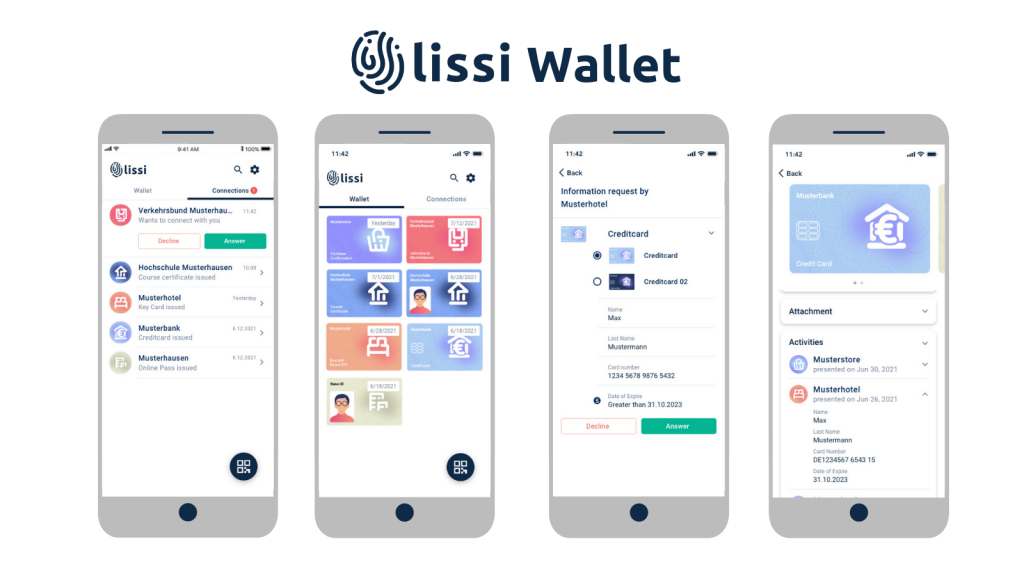
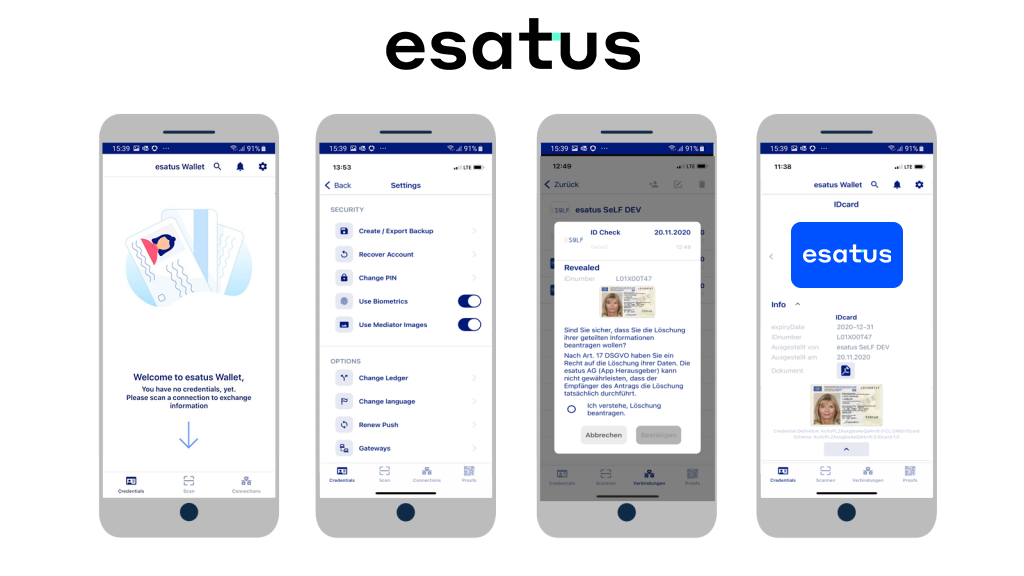
Two wallets currently support the IDUnion network
Business Partner Agent
SSI Agent Solutions for Institutions
SSI Agents for Institutions enable organisations to establish direct communication channels third parties, as well as to create digital identities, verify and securely store digital identities. Through the SSI agent, organisations can securely interact with the wallets of end-users. The SSI agent also enables to interact securely and confidently with agents of other companies, even if they were previously not been a known supplier or partner.
The SSI agents for organisations are, so to speak, the digital safe of a company or institution in which all relevant information is safely stored and ready for interaction in the digital world. Furthermore, the agent serves as a direct communication channel with third parties. They enable a multitude of use cases within the industrial and business world. Currently, there are four such solutions that are compatible with the IDunion network:
Governance
The newly founded IDunion organisation will act as the legal entity behind the network and represent the stakeholders’ interests within a European Cooperative Society (Societas Cooperativa Europaea S.C.E.). In addition to operating the network, the organisation’s main tasks will be to attract new partners and to bring together partners working on the same or similar use cases (Use Case Matching). The IDunion organisation is open to all institutions in the European free trade area.
IDunion’s aim is to establish one of the leading and most secure identity networks in Europe, which is primarily tailored to the needs of the public sector and the private economy. The participants in the network have defined rights and obligations to enable legally binding relationships which are in harmony with the European legal framework (especially eIDAS and GDPR).
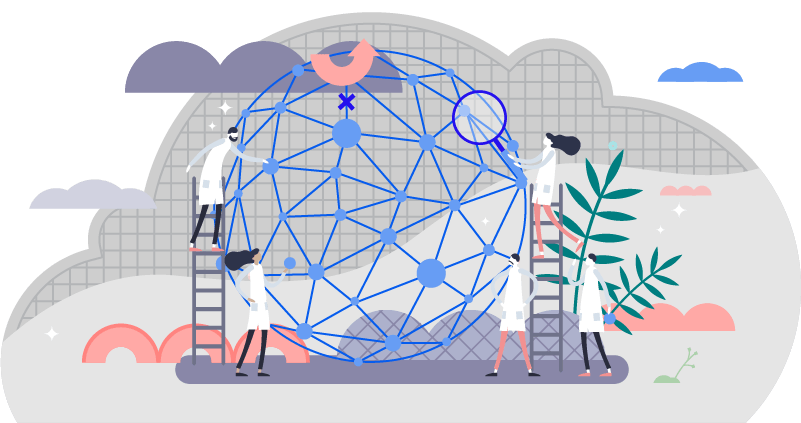
Technical overview & standards
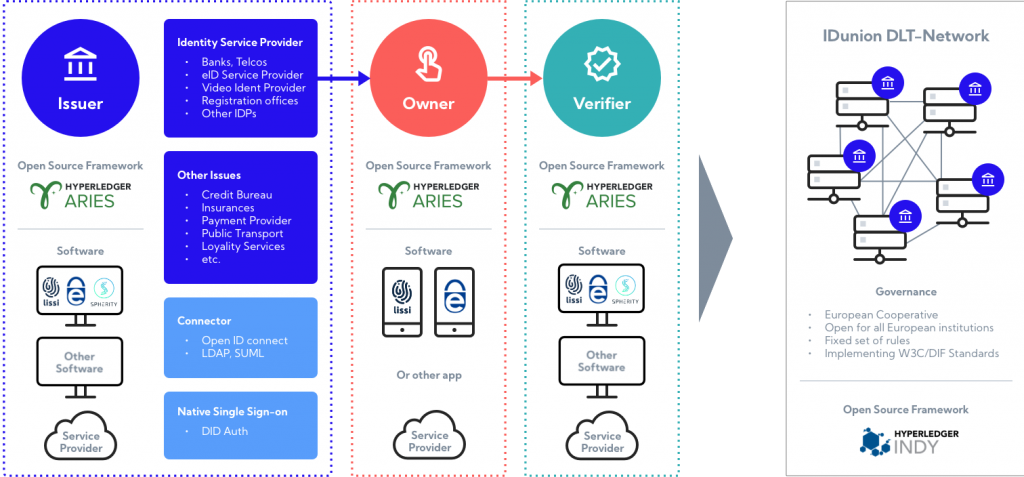
Used technology and standards
The IDunion network is based on the Trust over IP (ToIP) model, which divides the
components into four successive layers. The first layer is the IDunion network or similar
networks. The second layer deals with the communication between the individual agents.
Together these two layers form the technical trust.
The third layer explains the individual roles (issuer, holder, verifier) and their connection to
each other. The fourth layer deals with specific ecosystems for use cases such as the
financial industry, mobility, health or public services. Together, the third and the fourth layer
enable social trust.
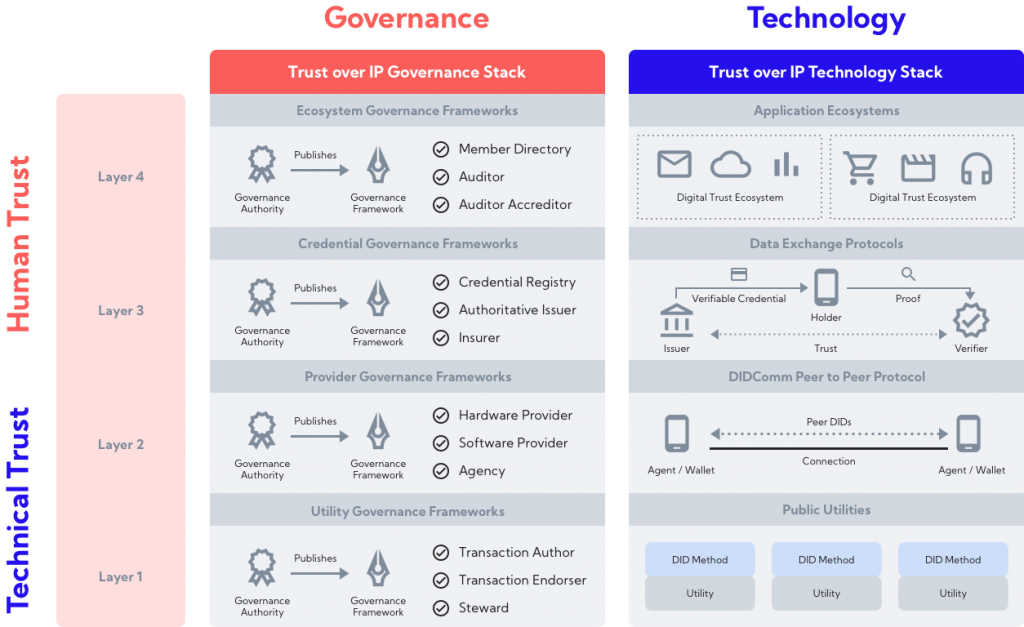
IDunion uses international standards for the development of the identity network and
agents. The following standards are core components:
- Verifiable Credentials specified by the World Wide Web Consortium (W3C).
- Decentralised identifiers (DID), as proposed by W3C, with the use of anywise
and peerwise DIDs. -
DIDcomm messaging protocol, as specified by the Decentralized Identity
Foundation (DIF) for the communication between agents.
Contact us
Lissi GmbH
Eschersheimer Landstraße 6
60322 Frankfurt am Main
info@lissi.id
(Please note the information in the privacy policy)
